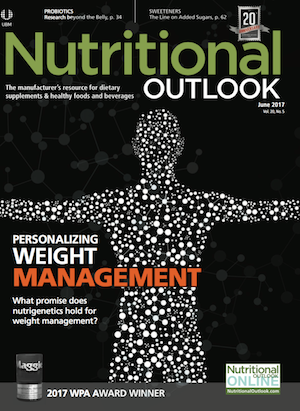Is Full Traceability Possible Given the Complexities of Today’s Dietary Supplement Supply Chain?
Is it really true that you need to own your entire supply chain before you can achieve full traceability?
Photo © iStockphoto.com/Henrik5000

Lately, we’ve seen the rollout of traceability initiatives from some very large brands in the dietary supplements space. Large companies know that investing in traceability boosts brand credibility, consumer trust, and profits. In March, I wrote about the latest retail giant to see the light: Amazon, whose Amazon Elements dietary supplement line debuted this spring with a heavy emphasis on traceability, right down to the QR codes on the products’ packaging that provide access to extensive product information. (In April, I also interviewed smaller brands (smaller than Amazon, anyway) to find out how they built their own traceability platforms.) In this, the third and final story in this traceability series, I ask this question: Can a company really maintain a grasp on traceability given the complexities of today’s supply chain?
This question stems from a conversation I had with Ric Scalzo, founder and CEO of Gaia Herbs, whom I interviewed in April. You could say that Scalzo knows a little bit about traceability. In 2010, long before Amazon launched its Elements line, Gaia Herbs introduced its Meet Your Herbs traceability platform, with on-package QR codes that provide the same kind of extensive product information that Amazon is touting only now, including lot-specific information on purity, potency, certificate of analysis, etc. Scalzo notes that Amazon’s model closely follows Gaia’s-or, as he puts it, “they 100% copied the Gaia Meet Your Herbs platform.”
He continues: “They were the first ones to actually duplicate our position, and yet, when you ask yourself whether [traceability] can be translated across the board for them and their private-label manufacturer? Probably not.”
Why is Scalzo doubtful it can work? Namely, it has to do with the way supply chains work today, he says. Scalzo says that Gaia’s strength is that it owns its entire supply chain “seed to shelf,” enabling the company to control everything from farming to extraction and testing, meaning it has full control over its supply. By contrast, he says, more likely than not, large companies like Amazon (and companies of all sizes, for that matter) or their private-label or contract manufacturers are purchasing premade extracts from ingredient suppliers and, as such, he says, the ingredient’s complete supply chain isn’t always fully visible to the brand-at least not to the extent that Gaia’s is.
“Any private-label manufacturer might be able to [trace an ingredient] on one, two, three products where they know that they can control the supply chain and control the extraction themselves,” Scalzo says, “but when you try to apply that principle to an entire brand, I don’t think anyone can do it,” without a "seed-to-shelf" system like Gaia’s, he says. “That’s where you lose the trail of command, so to speak…They can’t control all of the elements that go into supply, nor will they necessarily be able to do it for every ingredient in every product.”
Is it really true that you need to own your entire supply chain before you can achieve full traceability? Or can you rely on a supplier do that work for you-assuming, of course, that you’re vetting that supplier to ensure your own compliance with Good Manufacturing Practices? Many suppliers, after all, are making great efforts to highlight how their own traceability initiatives guarantee ingredient quality. After the Natural Products Expo West trade show in March, for instance, I reported on how ingredients giant Cargill (Minneapolis) is now branding its longstanding identity-preservation/traceability program under the name KnownOrigins-a program the company says invokes traceability back to the ingredient producers and involves extensive testing to verify non-GMO status. Last year, another supplier, Naturex (Avignon, France), began promoting Trace, the company’s five-step program that involves a battery of test methods, including DNA testing, to affirm ingredient authenticity. During Expo West, Lea Buerman, Cargill’s food safety, quality, and regulatory manager, told me that Cargill’s program “gives our customers the confidence and trust that if Cargill says it’s non-GMO, it’s non-GMO and they can feel confident about putting a non-GMO claim on their package.”
Ingredient suppliers with these types of precautionary programs certainly are playing a role in helping finished-product companies succeed in their own traceability missions. Scalzo himself acknowledges that if a raw-material supplier can indeed manage traceability in this way, traceability can work. “If,” he says, “a company goes back to the growers and has all of the input specifications for the growers, and then at the raw-material level that can be carried through all of the extraction phase and up to the finished-ingredient phase, and then you can supply that trail of traceability from the seed all the way up, then yes, [traceability] becomes a doable proposition.”
Scalzo adds that when it comes to traceability, there’s also a larger issue to discuss-namely, the issue of how companies define quality. “Most companies will define quality very differently” today, he says. This variation could make it more difficult, I’d imagine, if you’re trying to implement a traceability program involving many parties-growers, raw-material suppliers, distributors, manufacturers-where everyone needs to be on the same page in order to meet an agreed-upon quality standard. That’s another conversation to be had as more companies invest in traceability and the concept of traceability evolves.
Also read:
Amazon Elements Dietary Supplements: Fear, or Follow?
Can Small Dietary Supplement and Food Brands Also Build Traceability Platforms?
Jennifer Grebow
Editor-in-Chief
Nutritional Outlook magazine
jennifer.grebow@ubm.com

Prinova acquires Aplinova to further increase its footprint in Latin America
April 7th 2025Prinova has recently announced the acquisition of Brazilian ingredients distributor Aplinova, which is a provider of specialty ingredients for a range of market segments that include food, beverage, supplements, and personal care.



















